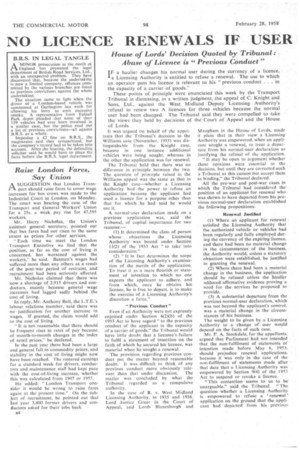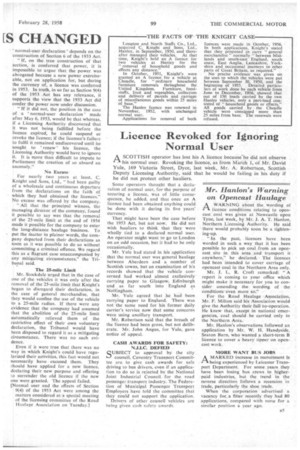NO LICENCE RENEWALS IF USER [S CHANGED
Page 38

Page 39

If you've noticed an error in this article please click here to report it so we can fix it.
House of Lords' Decision Quoted by Tribunal : Abuse of Licence is "Previous Conduct"
JF a haulier changes his normal user during the currency of a licence, a Licensing Authority is entitled to refuse a renewal. The use to which an operator puts his licence is relevant to his "previous conduct . . . in the capacity of is carrier of goods."
These points of principle were enunciated this week by the Transport Tribunal in dismissing, in a written judgment, the appeal of C. Knight and Sons, Ltd., against the West Midland Deputy Licensing Authority's refusal to renew two A licences for three vehicles because the normal user had been changed. The Tribunal said they were compelled to take the views they held by decisions of theCourt of Appeal and the House of Lords.
Raise London Fares, Say Union
A SUGGESTION that London Trans1-1, port should raise fares to cover wage increases for bus crews was made to the Industrial Court. in London, on Monday. The court was hearing the case of the Transport and General Workers' Union for a 25s. a week pay rise for 47,595 workers.
Mr. Harry Nicholas, the Union's assistant general secretary, pointed out that bus fares had not risen to the same extent as prices for other services. ' "Each time we meet the London Transport Executive we find that the position, as far as the cost of living is concerned, has worsened against the workers," he said. Busmen's wages had suffered more than any others as a result of the post-war period of restraint, and recruitment had been seriously affected.
Mr. Nicholas claimed that there was now a shortage of 2,915 drivers and conductors, mainly because general wage increases had lagged sadly behind the cost of living.
In reply, Mr. Anthony Bull, the L.T.E.'s labour relations member, said there was no justification for another increase in wages. If granted, the claim would add to the cost of living.
"It is not reasonable that there should be frequent rises in rates of pay because of month-to-month changes in the index of retail prices," he declared.
In the past year there had been a large and general fall in commodity prices, and stability in the cost of living might now have been reached. The rostered earnings for a standard week for drivers, conductors and maintenance staff had kept pace with the cost-of-living increase, whether this was calculated from 1947 or 1955.
He added: "London Transport consider it would be wrong to raise fares again at the present time." On the subject of recruitment, he pointed out that last year 3,400 former drivers and conductors asked for their jobs back.
B4 It was argued on behalf of the appellants that the Tribunal's decision in the Williams case (November. 1955) was distinguishable from the Knight case, because in one instance additional vehicles were being sought, whereas in the other the application was for renewal.
The Tribunal held that there was no difference in principle between the two. The question of principle raised in the Williams appeal was the same as that in the Knight case—whether a Licensing Authority had the power to refuse an application because the applicant had used a licence for a purpose other than that for which he had said he would use it.
A normal-user declaration made on a previous application was, said the Tribunal, of capital importance for two reasons:—
(1) It determined the class of person whose objections the Licensing Authority was bound under Section 11(2) of the 1933 Act " to take into consideration."
(2) "It in fact determines the scope of the Licensing Authority's examination of the merits of the application. To treat it as a mere flourish or statement of intention to which no one expects the applicant to adhere, and from which, once he obtains his licence, he is free to depart, is to make the exercise of a Licensing Authority's discretion a farce."
"Previous Conduct" Even if an Authority were not expressly enjoined under Section 6(2)(b) of the 1933 Act to have regard "to the previous conduct of the applicant in the capacity of a carrier of goods." the Tribunal would have little doubt that a licensee's failure to fulfil a statement of intention on the faith of which he secured his licence, was material when he sought a renewal.
The provision regarding previous conduct put the matter beyond reasonable doubt. It was difficult to think of any previous conduct more obviously relevant than that under discussion. The matter was concluded by what the Tribunal regarded as a compulsive authority.
In the case of R. v. West Midland Licensing Authority, in 1935 and 1936, Lord Justice Greer in the Court of Appeal, and Lords Blanesburgh and
1Vlaugharri in the House of Lords, made it plain that in their view a Licensing Authority was empowered, when an applicant sought a renewal, to treat a departure from his normal-user declaration as justifying the refusal of the application.
"It may be open to argument whether these opinions were essential to the decision, but until they are corrected such a Tribunal as this cannot but accept them as binding," the Tribunal declared.
All the pre-war and post-war cases in which the Tribunal had considered the position of an applicant for renewal who was shown to have departed from his previous normal-user declaration established the following propositions: Renewal Justified
(1) Where an applicant for renewal satisfied the Licensing Authority that the authorized vehicle or vehicles had been regularly and fully employed during the currency of the expiring licence, and there had been no material change in the circumstances of the business, the Authority would, unless a statutory objection were established, be justified in granting the renewal.
(2) Where there had been a material change in the business, the application should be refused unless the haulier adduced affirmative evidence proving a need for the services he proposed to provide.
(3) A substantial departure from the previous normal-user declaration, which was not beyond the applicant's control. was a material change in the circumstances of his business.
The weight to be given by a Licensing Authority to a change of user would depend on the facts of each case.
Mr. F. A. Stockdale, for the appellants.
argued that Parliament had not intended that the non-fulfilment of statements of intention made before May 6, 1953. should prejudice renewal applications, because it was only in the case of the non-fulfilment of statements made after that date that a Licensing Authority was empowered by Section 9(4) of the 1953 Act to suspend or revoke a licence.
" This contention seems to us to be unarguable," said the Tribunal. "The question whether a Licensing Authority is empowered to refuse a ' renewal ' application on the ground that the applicant had departed from his previous 'normal-user declaration* depends on the construction of Section 6 of the 1933 Act.
"If, on the true construction of that section, is conferred that power, it is impossible to argue that the power was abrogated because a new power exerciseable, not on application for, but during the currency of, a licence was conferred in 1953. In truth, in so far as Section 9(4) of the 1953 Act has any relevance, it supports the view that the 1933 Act did confer the power now under discussion.
" If it did not, the position in the case of a normal-user declaration' made after May 6, 1953, would be that whereas, if a Licensing Authority discovered that it was not being fulfilled before the licence expired, he could suspend or revoke the licence; if the licensee's failure to fulfil it remained undiscovered until he sought to ' renew ' his licence, the Licensing Authority would have to ignore it. It is more than difficult to impute to Parliament the creation of so absurd an anomaly."
No Excuse For nearly two years at least, C. Knight and Sons, Ltd., "had been guilty of a wholesale and continuous departure from the declarations on the faith of which they had obtained the licences." No excuse was offered by the company.
"All that the principal witness, the managing director of the company, found it possible to say was that the removal of the 25-mile limit at the end of 1954 made it possible for the company to enter the long-distance haulage business. To put the rinatter in plainer words, the company departed from their declarations as soon as it was possible to do so without committing a criminal offence. We regard this as a flagrant case unaccompanied by any mitigating circumstances," the Trburial said.
The 25-mile Limit
Mr. Stockdale urged that in the case of one of the vehicles it was only after the removal of the 25-mile limit that Knight's began to disregard their declaration, in the case of general merchandise, that they would confine the use of the vehicle to a 25-mile radius. If there were any evidence that the company had assumed that the abolition of the 25-mile limit automatically relieved them of the restrictive effect of their own voluntary declaration, the Tribunal would have been disposed to regard it as a mitigating circumstance. There was no such evidence.
Even if it were true that there was no way in which Knight's could have regularized their activities, this fact would not necessarily have excused them. They lhould have applied for a new licence, declaring their new purpose and offering to surrender the old licence if the new one were granted. The appeal failed. [Normal user and the effects of Section
9(4) of the 1953 Act were among the matters considered at a special meeting of the licensing committee of the Road Haulage Association on Tuesclay.1




















































































































